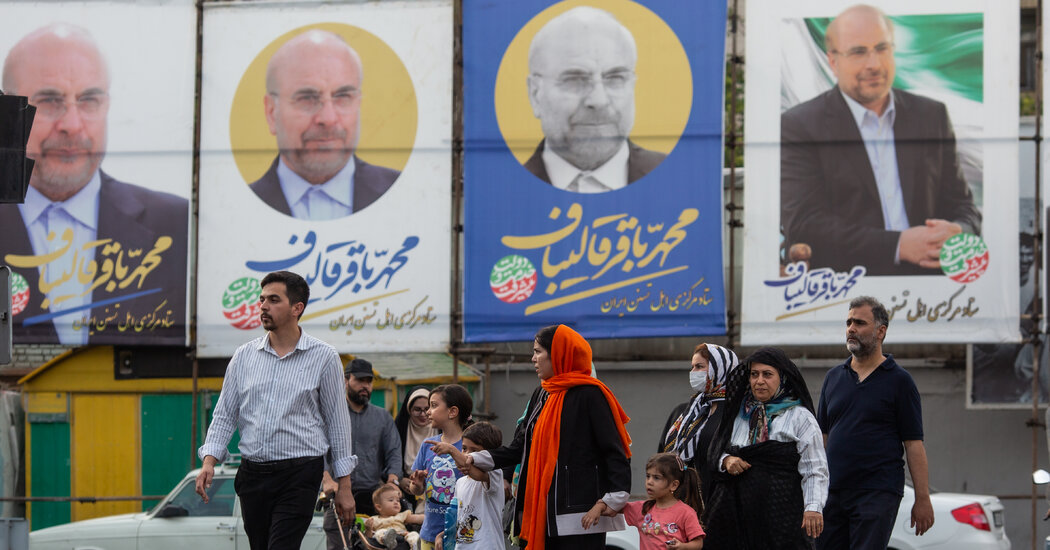Table of Contents
A heart surgeon, a former Tehran mayor and a cleric involved in the execution of political prisoners are among six candidates approved by officials to run in Iran’s election on Friday to replace the president who died in a helicopter crash last month.
The candidates have renounced Iran’s enforcement of the hijab. They have tackled US sanctions that have contributed to the country’s faltering economy and openly criticized the government in a series of debates, an unusual move in Iranian politics. Yet voter apathy in the country is high and divisions among conservative leaders make predicting the outcome difficult.
Although Iran’s Supreme Leader Ali Khamenei has ultimate authority over major state affairs, the president determines domestic policies and can influence foreign policy.
Iran’s Guardian Council, a committee of 12 jurists and clerics, has narrowed an initial list of 80 presidential candidates to six, disqualifying seven women, a former president and many other government officials. Four candidates remain in the race.
Two of the candidates – Amirhossein Ghazizadeh Hashemi and Alireza Zakani – dropped out of the race to consolidate the conservative vote. If no candidate wins a majority by Friday, a runoff election will be held on July 5 between the top two winners.
Iranian state TV polls before the election showed that reformist candidate Dr. Masoud Pezeshkian led with about 23 percent of the votes. The conservative vote was split between Mohammad Baqer Ghalibaf and Saeed Jalili, who each had about 16 percent. All fell short of the 50 percent majority needed to avoid a second round.
Here’s what you need to know about the four presidential candidates still in the race.
Mohammed Baqer Ghalibaf
Mohammad Baqer Ghalibaf is the current Speaker of Parliament and the former mayor of Iran’s capital, Tehran. The retired pilot and commander of the Islamic Revolutionary Guards Corps has repeatedly run for president without success.
He is also known for his role in the government’s violent repression of students, first in 1999 and then in 2003, when he served as the country’s police chief and reportedly ordered authorities to fire live ammunition on students.
Mr Ghalibaf faced accusations of financial corruption and moral hypocrisy over his family’s lavish spending abroad during his tenure as mayor of Tehran. He has denied the charges.
The conservative politician, who is said to have close ties to Mr Khamenei, has campaigned on a promise to cut government inefficiencies, and has criticised the government for losing money by ineffectively dealing with oil sanctions.
Mehrzad Boroujerdi, an Iran expert and dean of the Faculty of Arts, Sciences and Education at Missouri University of Science and Technology, said Mr. Ghalibaf has tried to characterize himself during debates as the “establishment candidate” on the side of the elite by positioning themselves as the only ones with the experience and ability to lead.
Masoud Pezeshkian
The only reform candidate on the ballot, Dr. Masoud Pezeshkian is a heart surgeon and veteran of the Iran-Iraq war who served in Iran’s parliament and as its health minister. After his wife and child died in a car accident, he raised his other children as a single father and never remarried. This, along with his identity as an Azeri, one of Iran’s ethnic minorities, has endeared him to many voters.
Reformist candidates were largely disqualified from the 2021 presidential and parliamentary elections in March. According to experts, Dr. Pezeshkian likely included to boost turnout among voters of reformist parties and Iranians boycotting March’s parliamentary elections. The government sees high turnout as crucial for the perceived legitimacy of the elections.
Dr. Pezeshkian was backed by former President Mohammad Khatami and has expressed openness to nuclear negotiations with the West, framing the debate as an economic issue.
Saeed Jalili
Saeed Jalili is an ultra-conservative former nuclear negotiator who was nicknamed “the living martyr” after losing a leg in the Iran-Iraq war. He heads the far-right Paydari party and represents the country’s most hardline ideological positions on domestic and foreign policy.
Mr. Jalili said he believes Iran does not need to negotiate with the United States for economic success. Although he is probably the candidate closest to Mr. Khamenei, he presents a “totally unrealistic” assessment of Iran’s economic potential to the public, Mr. Boroujerdi said.
“He is strongly opposed, not only to any nuclear deal, but also to any form of opening in the West,” Mr Boroujerdi said.
Mostafa Pourmohammadi
Mostafa Pourmohammadi is the only cleric running in these elections. A former counterintelligence director, he was a member of the committee that oversaw the execution of thousands of political prisoners at Evin prison in 1988. He has downplayed his role in the executions.
During a debate, he said candidly and eloquently that Iran’s biggest problem is that its government has lost popular support and cannot secure participation in the elections.
Mr Pourmohammadi has been critical of Iran’s support for Russia during its ongoing invasion of Ukraine, saying his country is not reaping enough benefits from supplying weapons to the Kremlin.
He has also cited former President Donald J. Trump in his campaign. “Just wait and see what happens when Trump comes,” he said during a recent televised debate. “We must prepare for negotiations.”
One of Mr Pourmohammadi’s campaign posters shows him and Mr Trump standing face to face, staring at each other. “The person who can stand for Trump is me,” it reads.


